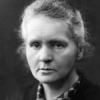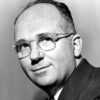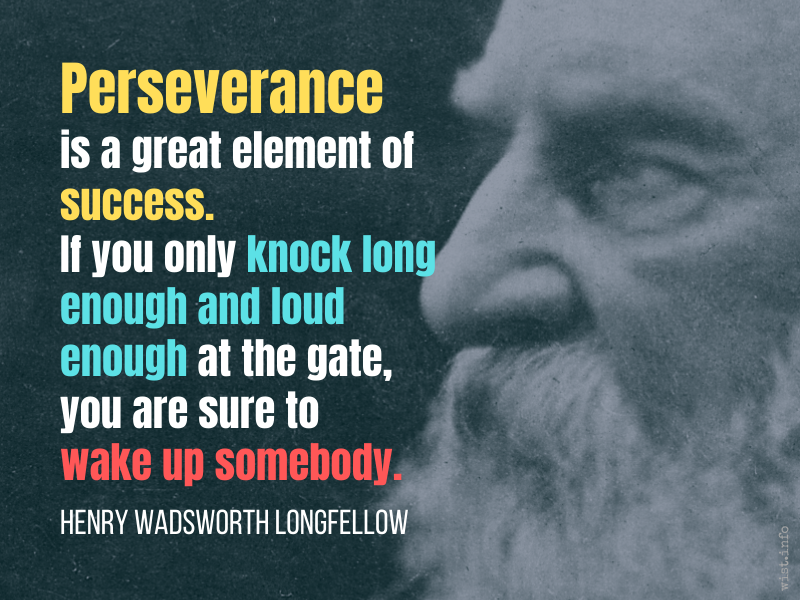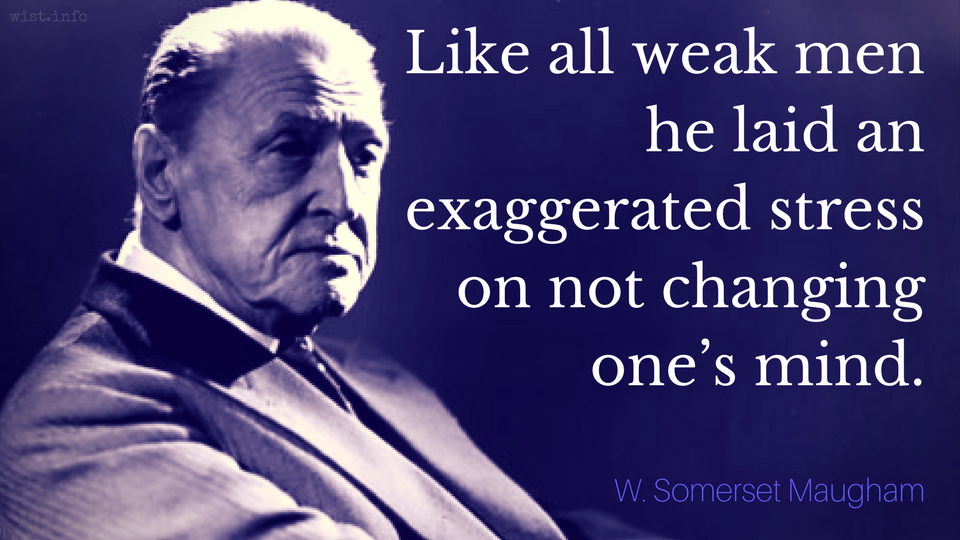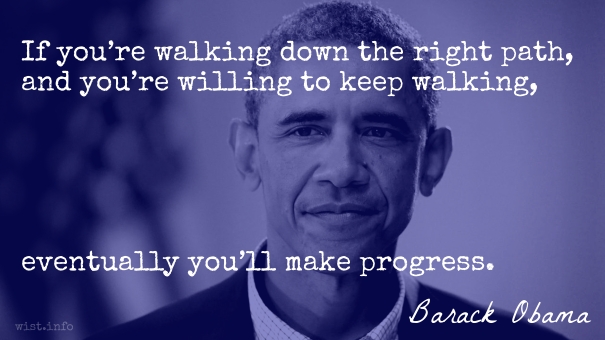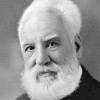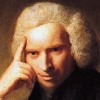It seems that life is not easy for any of us. But what of that? We must have perseverance and above all confidence in ourselves. We must believe that we are gifted for something, and that this thing, at whatever cost, must be attained.
[La vie n’est facile pour aucun de nous. Mais quoi, il faut avoir de la persévérance, et surtout de la confiance en soi. Il faut croire que l’on est doué pour quelque chose, et que, cette chose, il faut l’atteindre coûte que coûte.]
Marie Curie (1867-1934) Polish-French physicist and chemist [b. Maria Salomea Skłodowska]
Letter to her brother Joseph (1894-03-18)
(Source)
(French (Source))
As quoted in Eve Curie Labouisse, Madame Curie: A Biography, ch. 9 (1937) [tr. Sheean (1938)].
Quotations about:
stick to it
Note not all quotations have been tagged, so Search may find additional quotes on this topic.
Character consists of what you do on the third and fourth tries.
Perseverance is a great element of success. If you only knock long enough and loud enough at the gate, you are sure to wake up somebody.
The Vicar of Blackstable would have nothing to do with the scheme which Philip laid before him. He had a great idea that one should stick to whatever one had begun. Like all weak men he laid an exaggerated stress on not changing one’s mind.
W. Somerset Maugham (1874-1965) English novelist and playwright [William Somerset Maugham]
Of Human Bondage, ch. 39 (1915)
(Source)
Courage and perseverance have a magical talisman, before which difficulties disappear and obstacles vanish into air.
If you live long enough, you’ll make mistakes. But if you learn from them, you’ll be a better person. It’s how you handle adversity, not how it affects you. The main thing is never quit, never quit, never quit.
This is a vice in them, that were a vertue in us; for obstinacy in a bad cause, is but constancy in a good.
Thomas Browne (1605-1682) English physician and author
Religio Medici, Part 1, sec. 25 (1643)
(Source)
Perseverance must have some practical end, or it does not avail the man possessing it. A person without a practical end in view becomes a crank or an idiot. Such persons fill our asylums.
Alexander Graham Bell (1847-1922) Scottish-American scientist, inventor, engineer
Interview, in Orison Swett Marden, How They Succeeded, ch. 2 (1901)
(Source)
One word after another.
That’s the only way that novels get written and, short of elves coming in the night and turning your jumbled notes into Chapter Nine, it’s the only way to do it.
So keep on keeping on. Write another word and then another.Neil Gaiman (b. 1960) British author, screenwriter, fabulist
“Pep Talk from Neil Gaiman,” National Novel Writing Month (2011)
(Source)
Keep on going, and chances are you will stumble on something, perhaps when you are least expecting it. I never heard of anyone stumbling on something sitting down.
Charles F. Kettering (1876-1958) American inventor, engineer, researcher, businessman
(Attributed)
Variant:
"Keep on going and the chances are you will stumble on something, perhaps when you are least expecting it. I have never heard of anyone stumbling on something sitting down."
I am unable to find this precise phrase in Kettering's writings or primary writings about him. However, this appears to have been part of a common set of phrases he used, which indicates either it is accurate or a paraphrase of one of them:
Accomplishment has been an accident as a rule. Nobody ever stumbled while he was standing still. You only stumble when you are moving. So we always had it a rule in our organization when we lacked intelligence we speeded up motion, because the chances of stumbling infinitely increased.
"250 at Luncheon Honor Kettering," New York Times (1936-11-11)
Nobody ever found anything while sitting down. So, Q.E.D., don't be afraid to stumble.
“Don’t Be Afraid to Stumble,” The Rotarian (1952-01)
‘Tis known by the name of perseverance in a good cause — and of obstinacy in a bad one.
Laurence Sterne (1713-1786) Anglo-Irish novelist, Anglican clergyman
Tristam Shandy, 1.17 (1759-67)
See Browne.
The last quality, perseverance, I particularly respect: it is the very hinge of all virtues. — On looking over the world, the cause of nine parts in ten of the lamentable failures which occur in men’s undertakings & darken and degrade so much of their history, lies not in the want of talents or the will to use them, but in the vacillating and desultory mode of using them — in flying from object to object, in starting away at each little disgust, and thus applying the force which might conquer any one difficulty to a series of difficulties so large that no human force can conquer them. The smallest brook on earth, by continual running, has hollowed out for itself a considerable valley to flow in: the wildest tempest, by its occasional raging, over-turns a few cottages, uproots a few trees, and leaves after a short space no mark behind it. Commend me therefore to the Dutch virtue of perseverance! Without it all the rest are little better than fairy gold, which glitters in your purse, but when taken to the market proves to be — slate or cinders.
Thomas Carlyle (1795-1881) Scottish essayist and historian
Letter to John Carlyle (15 Mar 1822)
(Source)
[I]t was followed by a long scream of rage mixed with a roar of complaint: “AAaargwannawannaaaagongongonaargggaaaaBLOON!” which is the traditional sound of a very small child learning that with balloons, as with life itself, it is important to know when not to let go of the string. The whole point of balloons is to teach small children this.
Terry Pratchett (1948-2015) English author
A Hat Full of Sky, ch. 11 “Arthur” (2004)
(Source)
This is apparently the origin of the much more frequently found paraphrase:
There are times in life when people must know when not to let go. Balloons are designed to teach small children this.
This shorter form has been used, among other places, in a Change.org petition to Death to reinstate Pratchett after the author's passing. It is possible Pratchett may have used it somewhere else, but I am unable to find it (it does not show up in the alt.fan.pratchett board in any message from him).
See also Cox.
However highly we must value courage and steadfastness in war, and however little prospect of victory there is for him who cannot resolve to seek it by the exertion of all his strength, still there is a point beyond which perseverance can only be called desperate folly, and therefore cannot be approved by any critic.
[Wie hoch auch der Wert des Mutes und der Standhaftigkeit im Kriege angeschlagen werden muß, und wie wenig Aussicht der zum Siege hat, der sich nicht entschließen kann, ihn mit der ganzen Kraftanstrengung zu suchen, so gibt es doch einen Punkt, über den hinaus das Verharren nur eine verzweiflungsvolle Torheit genannt und also von keiner Kritik gebilligt werden kann.]
Karl von Clausewitz (1780-1831) Prussian soldier, historian, military theorist
On War [Vom Kriege], Book 4, ch. 9 “The Battle: Its Decision [Die Hauptschlacht. Ihre Entscheidung],” (4.9) (1832) [tr. Jolles (1943)]
(Source)
(Source (German)). Alternate translations:
However highly we must esteem courage and firmness in war, and however little prospect there is of victory to him who cannot resolve to seek it by the exertion of all his power, still there is a point beyond which perseverance can only be termed desperate folly, and therefore can meet with no approbation from any critic.
[tr. Graham (1873)]
No matter how highly rated the qualities of courage and steadfastness may be in war, no matter how small the chance of victory may be for the leader who hesitates to go for it with all the power at his disposal, there is a point beyond which persistence becomes desperate folly, and can therefore never be condoned.
[tr. Howard & Paret (1976)]
‘Tis a lesson you should heed,
Try, try again;
If at first you don’t succeed,
Try, try again.(Other Authors and Sources)
T. H. Palmer, “Try, Try Again,” The Teacher’s Manual (1840)
(Source)
Sometimes attributed to Charles Theodore Hart Palmer (1827-1897), but the book is clearly by Thomas H. Palmer, and was published in 1840 when Charles T. H. Palmer was 13 years old.
If there is such a thing as luck, then I must be the most unlucky fellow in the world. I’ve never once made a lucky strike in all my life. When I get after something I need, I start finding everything in the world I don’t need — one damn thing after another. I find ninety-nine things I don’t need, and then comes number one hundred , and that — at the very last — turns out to be just what I had been looking for.
Never give in, never give in, never, never, never — in nothing, great or small, large or petty — never give in except to convictions of honour and good sense. Never yield to force; never yield to the apparently overwhelming might of the enemy.
Winston Churchill (1874-1965) British statesman and author
Speech, Harrow School, England (1941-10-29)
(Source)
Those who never retract their opinions love themselves more than they love truth.
[Ceux qui ne se rétractent jamais s’aiment phis que la vérité.]
Joseph Joubert (1754-1824) French moralist, philosopher, essayist, poet
Pensées [Thoughts], ch. 11 “De la Vérité, de l’Illusion et de l’Erreur [Of Truth, Illusion, and Error],” ¶ 57 (1850 ed.) [tr. Attwell (1896), ¶ 161]
(Source)
(Source (French)). Alternate translations:
They who never retract, love themselves more than truth.
[tr. Calvert (1866), ch. 10]
Those who never retract love themselves better than truth.
[tr. Lyttelton (1899), ch. 10, ¶ 29]
Men who never take back their words love themselves more than truth.
[tr. Collins (1928), ch. 10]
Those who never back down love themselves more than they love the truth.
[tr. Auster (1983)], 1806]
The baby rises to its feet, takes a step, is overcome with triumph and joy — and falls flat on its face. It is a pattern for all that is to come! But learn from the bewildered baby. Lurch to your feet again. You’ll make the sofa in the end.
Pamela Brown (1924-1989) British writer, actress, television producer
The Swish of the Curtain (1938)
Our greatest glory is, not in never falling, but in rising every time we fall.
Oliver Goldsmith (1730-1774) Irish poet, playwright, novelist
The Citizen of the World: or, Letters from a Chinese Philosopher, Residing in London, to His Friends in the East, Letter 7 (1762)
(Source)
Ostensibly from a Chinese visitor to London, Lien Chi Altangi, the letters were written by Goldsmith and published in The Public Ledger in 1760-61. Letter 22 has the similar "True magnanimity consists not in NEVER falling, but in RISING every time we fall."
The saying is often attributed to Confucius (Letter 7's introduction implied that they were), but is not found in Confucius' work. The saying is also sometimes attributed to Ralph Waldo Emerson. See here for more discussion.
All great masters are chiefly distinguished by the power of adding a second, a third, and perhaps a fourth step in a continuous line. Many a man had taken the first step. With every additional step you enhance immensely the value of your first.
Ralph Waldo Emerson (1803-1882) American essayist, lecturer, poet
“Powers and Laws of Thought,” Natural History of Intellect, Lecture 1, Harvard (1870, Spring)
(Source)

